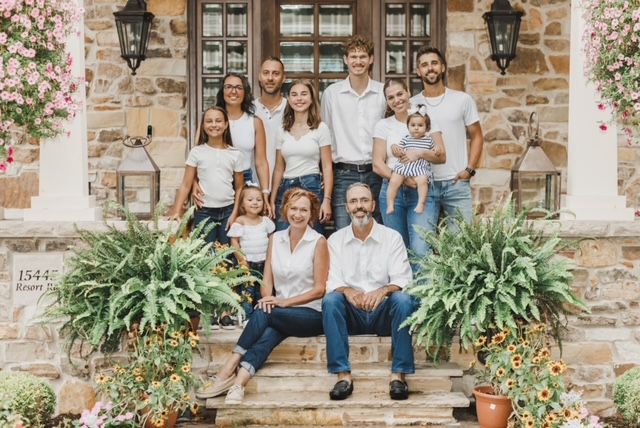Fast Access

Jerry and Madalaine McDaniel with their family.
A couple years ago, Jerry McDaniel was having back problems and went for a CAT scan. He was friends with the radiologist who said, “Your back is fine, but you’ve got something else going on. Come here; I’ll show you.”
They went into his office, and the radiologist pointed to an area on the screen. “There’s something in your diaphragm that shouldn’t be there. You should see a cardiologist.”
Jerry heeded the advice and saw a local cardiologist who identified a restriction in his aorta and said, “Let’s keep an eye on it.”
About a year later Jerry went to get a cortisone shot in his knee, and when the nurse took his blood pressure it was unusually high. “That’s typical for people about to get a shot,” the nurse reassured him. But Jerry didn’t think that was it. He didn’t feel nervous about the shot. He kept monitoring his blood pressure, and over the next couple days it continued to get higher—into stroke zone. He went to see his doctor who prescribed five medications and ordered another CAT scan, which showed the aorta was getting even more tightly restricted. Jerry’s doctor said he should consider surgery.
When Jerry called a major hospital nearby to make an appointment, he was told he could be scheduled in three months. That sounded too long to Jerry. For one thing, he didn’t feel well. For another, he thought five medications seemed excessive. And mostly, he was concerned he might be headed for a heart attack or stroke.
“I’m one of those type-A, get-stuff-done personalities. So I started calling my network of friends to see if anyone had ideas to get a quicker appointment.”
Fast-Tracked to the Right Place
A CEO friend reminded Jerry of his access to Healthnetwork Foundation, which he’d heard about through years of involvement with YPO and CEO, but had never before felt the need to utilize. Jerry called Healthnetwork and was connected with Dan Rush as his medical coordinator. From that moment, the speed at which things happened surprised even his type-A self.
Less than 24 hours after calling Healthnetwork: Jerry had an appointment within the week with a cardiologist in Cleveland Clinic’s top-ranked heart and vascular department.
Five days later: Jerry flew his plane to Cleveland.
5:00 pm: Jerry met with the cardiologist, who told Jerry he needed a vascular surgeon. “If there’s any chance I can see a surgeon while I’m in town, I’ll just stay,” Jerry said. The cardiologist picked up her cell and made a call. “Dr. Lee Kirksey will call you this evening about meeting you tomorrow.” On the way to the hotel, Jerry told his wife, “There’s not a snowball's chance in hell a vascular surgeon is going to call me tonight!”
7:00 pm: Jerry’s cell rang. It was Dr. Kirksey. Jerry couldn’t believe it. “He asked if I could meet him early the next morning so he could see me before an 8 a.m. surgery. Of course, I said I’ll be there.”
7:00 am the next morning: Dr. Kirksey confirmed what the cardiologist had said the day before. He told Jerry he believed the problem could be fixed with a stent in his aorta. “First we need to run a battery of tests. When do want to start?” “Now!” said Jerry. Dr. Kirskey ordered a series of tests, which Jerry completed before heading home.
Three weeks later: Jerry came back to Cleveland for additional tests.
Two weeks after that: Jerry came back to Cleveland once more for surgery, feeling as confident as one can feel when it comes to surgery on your heart. “I feel like I was super fortunate to get to this surgeon. He has something like 10,000 procedures under his belt.” Dr. Kirksey explained to Jerry that his aorta should be around 20 mm in diameter, but it was constricted to 4.5 mm. He said they needed to stretch it but wouldn’t know how much it could stretch until he got in there. “When I woke up from surgery Dr. Kirksey told me, ‘We hit a home run!’ They were able to stretch it to 16 mm.”
Fantastic Results
Jerry expected the stent would lower his blood pressure and his risk for heart attack or stroke. What he didn’t expect was to feel better post-surgery than he has felt in years.
“I’ve been on blood pressure meds most of my life, since my early 30s. I was always told, ‘You’re running businesses, you’re stressed out.’ But the Cleveland Clinic doctors figure I was probably born with this problem in my heart. My body hadn’t been getting enough blood flow for a long time. I didn’t feel bad my whole life; I just didn’t know what I was missing. I feel fantastic now. The other day I ran a mile for the first time in probably 30 years.”
A Fortunate Man
“I’m lucky they found it when they scanned me for a back problem. And I feel fortunate to have Healthnetwork and be connected with the surgeon I had,” says Jerry. “I’ve been a fortunate man in many ways. I’ve run many businesses, and I’ve done well in life. The only thing that is going to mess us up at this point is a health issue. I’m approaching 60, and my wife and I are starting to pay more attention to our health. We’re at the gym every day, eating well, getting good medical care. Healthnetwork doesn’t just connect you to good healthcare; they stay with you all the way until you’re home. I’m glad to support them now, for ten years, and longer. I might never need it again, but I don’t think you just write a check when something bad happens. I want to support the organization and support medicine. We joined Family Legacy so we can give our entire family the access to Healthnetwork when they need it. It was a pretty easy decision.”
